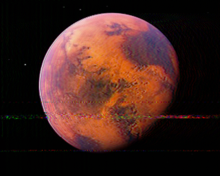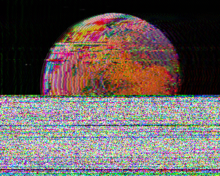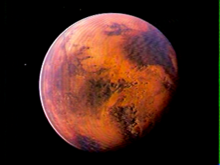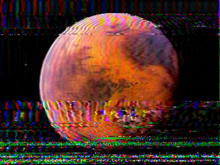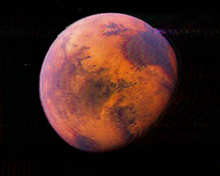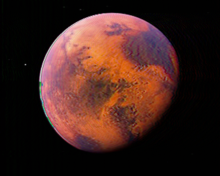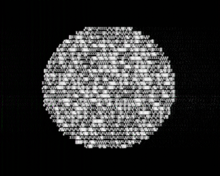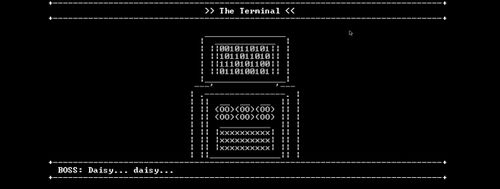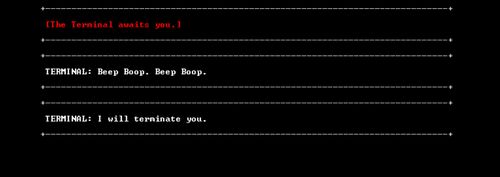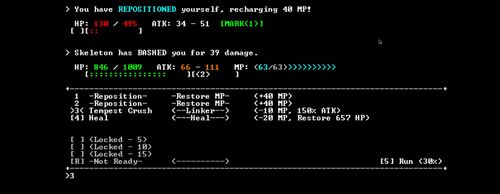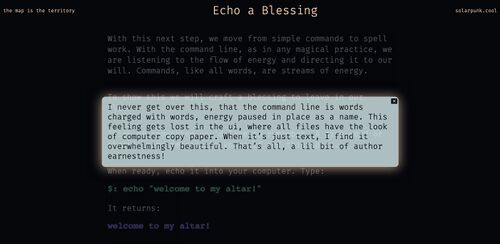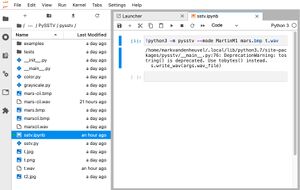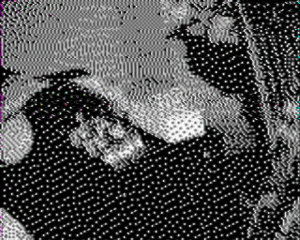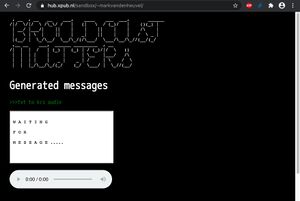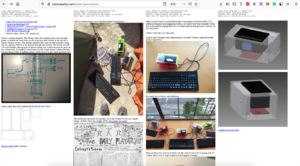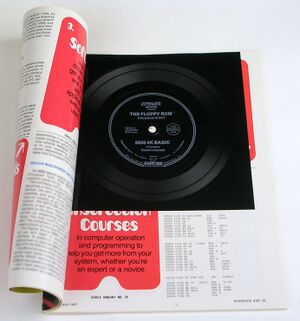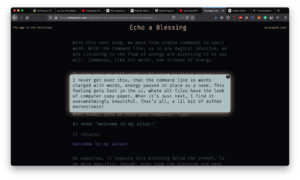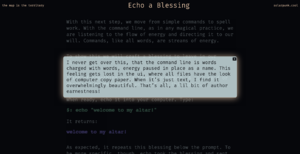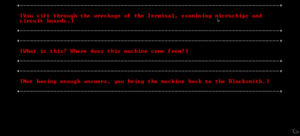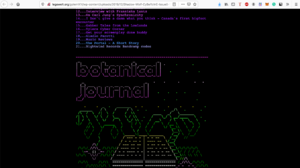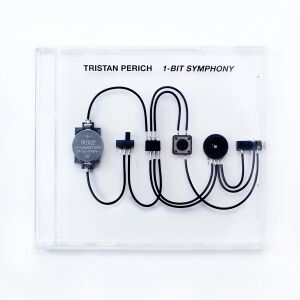User:Markvandenheuvel/prototyping hackpacts: Difference between revisions
No edit summary |
|||
| Line 2: | Line 2: | ||
Prototypes: | Prototypes: | ||
* IRC bot experiments | |||
* 1-Bit sound synthesis on a (hacked) TI calculator | |||
* SSTV tests: sending / recieving (encoding - decoding, storing on tape) | |||
* Ascii quillting and AALIB experiments: img to txt / generator | |||
* KCS workflow (text input > generated text > KSC audio > HTML) | |||
* API scraping (nasa data mixed with) | |||
* py.rate: tape loop creation and recording (materiality + deconstruction of sound) | |||
* writing: interactive fiction (based on course structure) | |||
Revision as of 22:36, 1 December 2020
Hackpacts: "Home school" prototyping
Prototypes:
- IRC bot experiments
- 1-Bit sound synthesis on a (hacked) TI calculator
- SSTV tests: sending / recieving (encoding - decoding, storing on tape)
- Ascii quillting and AALIB experiments: img to txt / generator
- KCS workflow (text input > generated text > KSC audio > HTML)
- API scraping (nasa data mixed with)
- py.rate: tape loop creation and recording (materiality + deconstruction of sound)
- writing: interactive fiction (based on course structure)
Asessement: Michael says" "BE SELECTIVE!"
To add:
- SI #10: flakes
- SP #12: Daisy Bell, Bird report, etc
- py.rate: creating! sharing
Project: CONVERSATION between formats (COURSE?)
mixed between practical info and fiction sending > recieving information focus on details regarding digital networking and data modulation (processing) meaning of text: ascii as image, code, sound, etc.
> Hosted on a Raspberry pi as publication!
Form of interactive fiction: (talking on a personal level) -welcome to my home, you are here: showing pi -you traveled a long way to get here - you just looked outside trough a window, staring at the screen again, you think about the past.
playing with the regular interaction: "Are you a robot?
found tapes: -'alfa training' course for motivation, autonomy and confidence to make decisions -software (detail: music snippets of abba in between) - How to get online: recordings of course a process (mechanical typing sounds) - sound & music: leaders: 1bit music
TI-83+ calculator experiments:
- 1-bit music programming and playback (using HT2)
- materializing binary data + sound of the CPU
- recording on cassette tape (digital to analog processing)
Introduction of main interests:'
- interested in the meaning of using obsolete tech today: revisiting and explore it's potential instead of discarding it
- 'Zombie media'
- main interest in low-tech: reveal inner workings (transparency)
- implement it in today's workflow (audio/visual, programming, etc)
- Side interest: lo-fi music production and post-digital publishing
- Interested in working with limitations.
- creating workflows that reflect on what we use today
What I did:
- came across an DIY open-source project
- creates old calculators into 1-bit music composing tool (instrument)
- uses the binary output of TI-calculator to produce 1-bit sound
- 1-bit sound: on/off (real basics of electronics)
- Program ([Houston Tracker)] is still not being used so much.
- Bought the necessary stuff to get it running. (very flimsy, hard to install but it worked)
- uses audio input to load software (written in BASIC, same as C64)
***Demo: Wanna hear a 1-bit chord?***
So, that worked. Let's speculate about the publishing/sharing possibilities:
To spread this project and both music, I thought about making a publication/release/demo in one.
Not only for the music as an artist but also to spread the word about this project:
- I would write a 4 track album for it and release it on a TI-83.
- People that buy it would receive a TI with the tracks on it (collected from thrift store / Marktplaats)
- mail it to people
If interest arises:
- hands-on hardware to get started.
- See how tracks were produced might get people started
- enlarge interest, spread the word & expand community?
This way, the public can not only listen but also directly engage and get their hands dirty if preferred. What I also think is interesting that in contrary to making music with the sound chip of obsolete gaming consoles is that it's much further detached from retro aesthetics. So it focuses much more on the tech part and thinking how to use this device otherwise.
Resources
TiLP is a linking program for Texas Instruments' graphing calculators:
http://lpg.ticalc.org/prj_tilp/
HoustonTracker 2 is a music editor/sequencer for the Texas Instruments TI-82, TI-83/82STATS, and TI-83+/84+/SE. It allows you to compose and play multi-channel 1-bit music directly on your TI graphic calculator:
https://irrlichtproject.de/houston/
Graphlink cable for converting binairy data to sound:
https://www.amazon.com/Texas-Instruments-94327-Graphlink-USB/dp/B00006BXBS
playful ideas & potentials to further explore:
- publication to make 1-bit sound
- implementing graphics: bitmaps
- How to embed this in a modern context? What's the use?
- BASIC programming language
resources:
- Houston Tracker 2: https://www.irrlichtproject.de/houston/houston1/index.html
- DOORS GUI: https://dcs.cemetech.net/index.php/Doors_CS_7_Scratchwork
- graphics: https://www.ticalc.org/pub/win/graphics/
- 1-bit synthesis paper: https://www.gwern.net/docs/cs/2020-troise.pdf
- 1-bit synthesis techniques: https://phd.protodome.com/#anchor-pulse-width-sweep
SSTV (Slow scan television) experiments:
- materiality of data via sound
- 'slow' data transmission (in contrast with invisible processes and speed)
- encoding /decoding: deconstruction of data
- both interests combined: lo-tech graphics & sound!
playful ideas & potentials to further explore:
- IRC bots that send audio signals you can receive with your phone!
- Instagram offline broadcasting
- broadcasting images over Spotify
- music & SSTV data combined? https://www.youtube.com/watch?v=tJ2X6HmW49E
resources:
- boadcasting software: https://www.qsl.net/kd6cji/downloads.html
- Python scripts to convert images to audio: https://pypi.org/project/PySSTV/
- general resources: http://users.belgacom.net/hamradio/sat-info.htm
- RXSSTV: http://users.belgacom.net/hamradio/rxsstv.htm
- SSTV tools (encoding/decoding) http://www.dxatlas.com/sstvtools/
- recent SSTV project: https://hsbp.org/rpi-sstv
- Pictures On Cassette: https://www.youtube.com/watch?v=c38dLDQoRtM
- Sound file of Mars image(mode: MartinM1: File:Sstv mars.mp3
- Sound file of Mars ascii image (mode: MartinM1) File:Sstv ascii mars.mp3
KCS: digital data standard explorations
- KCS workflow setup in Python (Jupyter Notebook) (text input > generated text > KSC audio > HTML)
- slow data transmission / image arise line by line
- materiality of data via sound (physical connection, embodiment of a process)
- deconstruction: encoding/decoding
- storage and playback (on audio cassette)
playful ideas & potentials to further explore:
- bot that outputs encoded texts via audio
- bot that outputs encoded ascii art (ASCII IMAGES) via audio
- printing out text receipt printer
- creating a modern Flexi disc floppy rom: https://en.wikipedia.org/wiki/Kansas_City_standard#/media/File:FloppyRom_Magazine.jpg
resources:
- KCS standard: https://en.wikipedia.org/wiki/Kansas_City_standard
- Storing https://www.instructables.com/Storing-files-on-an-audio-cassette/
- future of data storage: https://spectrum.ieee.org/computing/hardware/why-the-future-of-data-storage-is-still-magnetic-tape
- Data Files on Tape (A Modern Attempt) https://youtu.be/muJDUonIOz8
Deconstruction workshop: materializing data over sound
- recording sound of a deconstruction process: transfer to the physical carrier (analog tape)
- recording data of images: broadcast SSTV signal
- material combined in audio-visual performance
main question:
- How do people interact with these processes?
- How is this sonic fiction (http://www.soundstudieslab.org/sonic-fiction/) element used?
Interactive Fiction / 'Text-based' adventure
File:Https://slideplayer.com/slide/13434284/80/images/9/Branching+Story+Example.jpg
https://en.wikipedia.org/wiki/Text-based_game https://en.wikipedia.org/wiki/Ergodic_literature
PI: Selfhosting IRC + bot
https://pythonspot.com/building-an-irc-bot/
Urzaloid Franklin
Sandbox as a publication:
- showing where it is! (this is where you are!)
- what happens when you visit (exposing a process with the emphasis on materiality)
resources:
- shell: showing processes! https://github.com/jupyter/terminado
A proof-of-concept for WebRTC signaling using sound. Works with all devices that have microphones + speakers. Runs in the browser.
Tape + sound/recording experiments
- the delay and reverb on binairy sounds - tapeloops: KCS code loops that generate textual / ascii output? - 1-bit drone
>>>>>>>C0/\/\/\/\0N F/\CT0R<<<<<<<
Related:
- 'wacky tech' (low and obsolete tech processes )
- what meaning emerges when low-tech meets high-tech
- regaining autonomy and the value of misusing technology
- revealing inner workings (trough sonification of a process)
- obsolete systems as a method (not retro!)
- the affordances of not emulating
- "sonic fiction"
- meaning that occurs when going between formats
general links:
- https://www.westminsterpapers.org/articles/10.16997/wpcc.209/print/
- https://www.electronicdesign.com/industrial-automation/article/21808186/sending-data-over-sound-how-and-why
- https://spectrum.ieee.org/computing/hardware/why-the-future-of-data-storage-is-still-magnetic-tape
- http://screenl.es/slow.html

